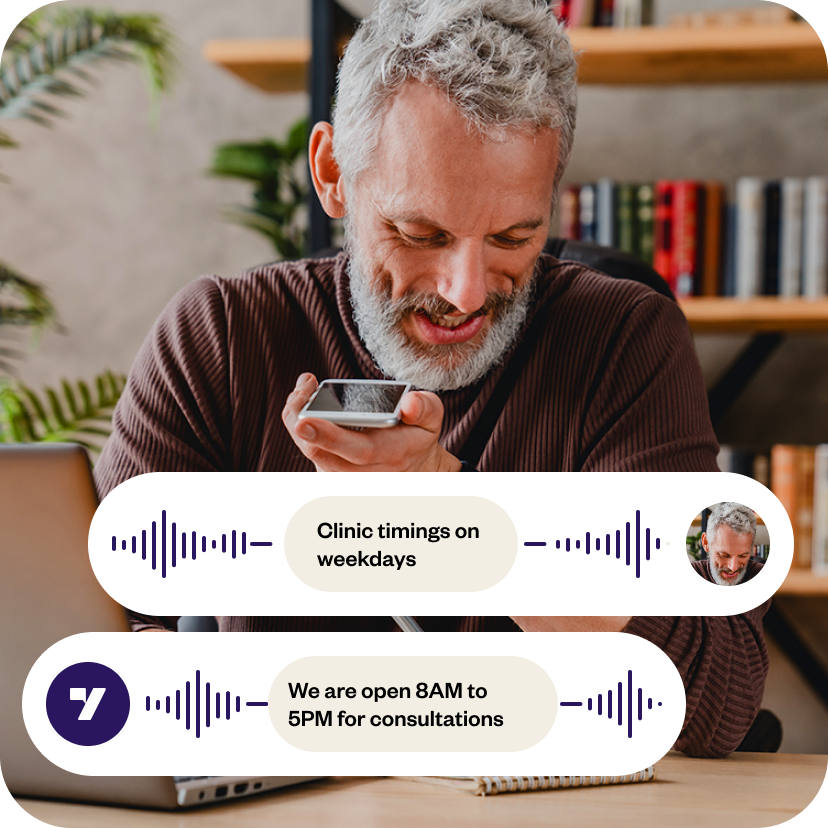Executive summary
The healthcare industry is witnessing a remarkable fusion of medicine and artificial intelligence (AI). This blog explains the transformative impact of AI in healthcare. We explain how AI is reshaping patient care, diagnosis, and treatment. We also explore the various benefits of AI, ranging from precision in disease diagnosis to innovations in drug discovery and beyond. The blog also showcases AI’s role in predictive analytics, robotic surgeries, and virtual health assistants, along with the pivotal function of healthcare chatbots.
Introduction
Artificial Intelligence is transforming the healthcare landscape. With AI, swift diagnoses, tailor-made treatments, and efficient preventive care are becoming the norm. Besides just being a technological fad, AI in healthcare is reshaping the very fabric of medical practice. It is vital to understand that AI is a lot more than just about automating tasks or reducing errors. In reality, it is a dynamic shift towards smarter, patient-centered care.
According to recent statistics, AI’s penetration in healthcare is substantial and growing: 35% of medical organizations are already harnessing AI in their operations, with another 42% poised to embrace it. This adoption is driven by AI’s ability to automate routine tasks, minimize human error, and significantly enhance patient care.
AI in healthcare is orchestrating a symphony of data, insights, and innovation. It’s about leveraging the unparalleled prowess of machine learning and data analysis to unlock new frontiers in medical research and patient care. This blog will unfold the layers of AI’s capabilities in healthcare. It explains how AI is transforming medical procedures. Furthermore, we also discuss how AI is empowering patients and healthcare providers with more informed choices and better outcomes.
What is Artificial Intelligence (AI)?
Artificial Intelligence is an expansive field in computer science aiming to create machines capable of intelligent behavior. It’s built upon several foundational elements, each contributing to its ability to mimic human intelligence:
Machine Learning (ML): This is the core of AI. Here, machines are programmed to comprehend and pick from data, observe patterns, and make decisions with minimal human intervention. ML algorithms are what enable AI systems to improve over time as they are exposed to more data.
Natural Language Processing (NLP): NLP is a crucial aspect of AI that focuses on the interaction between computers and human language. It involves programming computers to process and analyze large amounts of natural language data, enabling them to understand and interpret human language in a meaningful way.
Natural Language Understanding (NLU): As a subset of NLP, NLU is about enabling machines to understand and interpret the complexities and nuances of human language. It involves understanding the intent and context behind the words. It is essential in healthcare to understand patient queries, analyze clinical notes, and more.
Deep learning: It is a more advanced branch of ML. It simulates human decision-making by using neural networks. Its ability to process vast amounts of data and identify intricate patterns makes it invaluable in medical imaging, diagnostics, and predictive analytics.
Robotics and automation: AI also encompasses robotics, where machines can perform tasks autonomously. In healthcare, this might involve robotic surgeries or automated laboratory systems, enhancing precision and efficiency.
Artificial Intelligence (AI) emerged as a game-changer in healthcare. It is reshaping our approach to medical care and research. AI is a multifaceted concept defined by the ability of machines to replicate human intelligence processes. It includes learning from data, reasoning from information, and making decisions that would traditionally require human cognition.
The transformative power of AI in healthcare is vast. It enhances precision in diagnosis, optimizes treatment plans, and even assists in drug discovery. For healthcare providers, AI works as an effective tool for making more informed decisions backed by data-driven insights, thereby saving time, reducing costs, and minimizing human errors.
The evolution of AI in healthcare
The journey of AI in healthcare is a story of groundbreaking evolution, marked by technological strides and profound impacts on patient care and medical practices. This narrative is about a transformation that’s redefining healthcare delivery.
The current state
Today, AI is a reality reshaping healthcare. Its ability to process complex and voluminous data is revolutionizing how diseases are diagnosed and managed. From chronic conditions to cancer, AI’s role in predictive analytics, risk assessment, and identifying treatment pathways is invaluable.
Financial indicators underscore the significance of AI in healthcare. In 2020, the global AI healthcare market stood at $4.9 billion. In 2024, it’s projected to reach $45.2 billion. These numbers reflect a staggering compound annual growth rate (CAGR) of nearly 45%. This progress graph narrates AI’s potential to save more than its market value in healthcare costs by 2026. AI-based healthcare startups exemplify this trend, raising over $2.5 billion in 2021 alone.
The future landscape
AI in healthcare is ready for an exponential growth trajectory. By 2026, it’s expected to save an estimated $150 billion in healthcare costs. These numbers testify to AI’s capability to optimize healthcare efficiency and effectiveness.
In practical terms, while AI may not replace human medical professionals, it complements their work in various areas. From robotic surgeries and virtual health assistants to advanced diagnostic tools and patient management systems, AI is enhancing the healthcare landscape.
Role of Artificial Intelligence (AI) in healthcare
Incorporating Artificial Intelligence (AI) in healthcare signifies a paradigm shift, transforming patient care and administrative processes alike. Below are the roles of AI across various healthcare domains, showing its intricacies and practical applications.
1. Disease diagnosis
AI systems excel in analyzing complex diagnostic data. Through advanced algorithms, these systems can recognize patterns in X-rays, MRIs, or genetic information, often detecting diseases such as cancer more swiftly and accurately than traditional methods. For example, AI algorithms in dermatology have proven effective in distinguishing between benign and malignant skin lesions with remarkable accuracy, aiding dermatologists in early cancer detection.
2. Treatment personalization
AI enables the customization of patient care by analyzing individual health records, genetic information, and lifestyle factors. It aids in identifying the most effective treatment plans for individual patients. For instance, in oncology, AI tools analyze various data points to recommend personalized drug combinations, potentially improving treatment outcomes and minimizing side effects.
Improve patients’’ care with personalized healthcare and treatment

3. Drug discovery and development
AI accelerates the drug discovery process, analyzing biological and chemical data to identify potential drug candidates. It shortens the drug development timeline and also improves the likelihood of success. AI algorithms can predict how different compounds will behave and how likely they are to make an effective treatment, thereby refining the drug discovery process.
4. Predictive analytics
AI’s predictive analytics are instrumental in forecasting healthcare trends and patient outcomes. By processing large datasets, AI can predict disease outbreaks, patient readmission risks, and likely disease progressions. These insights enable healthcare providers to proactively manage health conditions and prepare for epidemiological events.
5. Robot-assisted surgery
Robotic surgery, guided by AI, enhances precision and control during operations. These AI systems can analyze data from pre-op medical records to guide surgeons in real time during procedures. The minimally invasive techniques enabled by robot-assisted surgeries lead to reduced patient recovery time and reduce the risk of infection.
6. Virtual health assistants and chatbots
AI-driven virtual assistants and chatbots are redefining patient engagement and support. These platforms can handle queries, schedule appointments, and provide medication reminders, enhancing the efficiency of patient-provider interactions. For instance, AI chatbots in mental health can offer initial counseling and mood tracking, offering support until a human professional is available.
7. Administrative workflow assistance
AI significantly reduces the administrative burden in healthcare settings. From patient data management to processing insurance claims and automating billing systems, AI streamlines administrative processes. That allows healthcare staff to focus more on patient care and less on paperwork.
8. Clinical trial research
In clinical trials, AI improves the selection process for trial participants, identifies optimal trial sites, and predicts the success rates of studies. By analyzing historical data and current medical trends, AI ensures the efficient design and execution of clinical trials. Hence, it accelerates the development of new therapies.
9. Remote monitoring and wearables
Wearable devices powered by AI constantly monitor patients’ health metrics. It helps in providing vital data for remote patient monitoring. This real-time data tracking allows for timely interventions in chronic diseases. Moreover, it enhances patient management outside traditional healthcare settings.
10. Radiology and pathology
AI algorithms assist in analyzing and interpreting medical images, such as CT scans and pathology slides. These tools enhance the accuracy of diagnoses by identifying subtle patterns that the human eye might miss. It leads to earlier detection of conditions like tumors or strokes.
11. Mental health
AI tools in mental health provide innovative solutions like sentiment analysis and behavior prediction. These tools can monitor patient speech patterns and social media activity to identify signs of mental health issues, providing timely alerts for interventions.
12. Ethical and privacy considerations
The use of AI in healthcare necessitates stringent adherence to ethical standards and privacy regulations. AI systems must be designed robustly to protect sensitive patient data and ensure unbiased, equitable treatment recommendations.
13. Continuous learning and improvement
AI systems in healthcare are designed for continuous learning, allowing them to adapt and improve with every interaction. This feature ensures that healthcare delivery becomes more refined and personalized over time.
14. Interoperability and data integration
AI enhances interoperability in healthcare systems. Hence, it facilitates seamless data sharing and integration across platforms. This capability ensures a more cohesive and comprehensive view of patient health, which is crucial for effective treatment planning and decision-making.
What are the benefits of healthcare chatbots?
Healthcare chatbots enhance patient care and operational efficiency. These AI-driven chatbots, designed with sophisticated algorithms and machine learning capabilities, offer numerous benefits:
1. 24/7 patient engagement: Healthcare chatbots provide round-the-clock support, addressing patient inquiries at any time. This constant availability ensures patients always have access to essential information and support. That significantly enhances patient experience and engagement.
2. Personalized patient interaction: AI chatbots offer personalized communication based on patient history and preferences. They can tailor their responses and recommendations, making each patient interaction unique and more meaningful.
3. Efficient appointment scheduling: Chatbots streamline the appointment scheduling process by handling bookings, reminders, and rescheduling requests. This efficiency reduces administrative burdens and improves the overall patient appointment experience.

4. Symptom checking and preliminary diagnosis: AI chatbots can perform initial symptom assessments, guiding patients through a series of questions to understand their condition better. While not a complete replacement for professional diagnosis, they provide valuable preliminary insights.
5. Medication management and adherence: Chatbots can remind patients about medication schedules, ensuring adherence to treatment plans. They can also provide information about drug interactions and side effects, promoting better medication management.
6. Reducing the workload on healthcare professionals: By handling routine inquiries and tasks, AI chatbots alleviate the workload on healthcare professionals. It allows medical staff to focus on more complex and critical patient care aspects.
7. Data collection and analysis: Healthcare chatbots gather valuable patient data during interactions. This data can be analyzed to gain insights into patient needs, preferences, and behavior, aiding in improving healthcare services and patient outcomes.
8. Improved access to healthcare information: Chatbots provide a convenient and accessible way for patients to access healthcare information. They can answer queries about diseases, treatments, and health tips, enhancing patient education and awareness.
9. Cost-efficiency: Chatbots reduce operational costs. The efficiency and scalability of chatbots make them a cost-effective solution for healthcare providers.
10. Enhanced patient satisfaction and loyalty: By offering quick, accurate, and personalized responses, healthcare chatbots enhance patient satisfaction. This improved experience fosters patient loyalty and trust in the healthcare provider.
11. Support for mental health: AI chatbots are increasingly used for mental health support. They provide a non-judgmental platform for patients with mental health conditions to express their feelings and receive guidance.

12. Language and accessibility: With multilingual capabilities, chatbots break down language barriers, making healthcare more accessible to diverse patient populations.
Discover how Yellow.ai can revolutionize your patient experience through automation
In the dynamic healthcare domain, where every second and every interaction counts, Yellow.ai emerges as a leader in innovation and efficiency. Our cutting-edge AI-driven chatbot solutions can enhance patient experiences and streamline healthcare operations. Here’s how Yellow.ai stands as a game-changer in healthcare automation:
Advanced AI technology: Yellow.ai chatbots are powered by sophisticated AI algorithms, ensuring responsive and deeply insightful interactions. Our chatbots understand patient needs through advanced natural language processing (NLP), providing a level of interaction that feels personal and empathetic.
Customized patient care: Each patient’s journey is unique, and Yellow.ai recognizes this by delivering personalized healthcare experiences. Whether it’s managing appointments or providing health information, Yellow.ai chatbots tailor their responses to individual patient profiles.
Seamless integration: These chatbots easily integrate with existing healthcare systems, ensuring a smooth transition and enhancing workflow without disruption.
Data analysis and insights: By analyzing interactions and patient data, Yellow.ai offers invaluable insights for healthcare providers, enabling them to refine their care strategies and understand patient needs better.
Scalable solutions: As healthcare demands grow, Yellow.ai’s Dynamic Automation Platform (DAP) solutions can help you scale accordingly, adeptly handling increased interactions and adapting to changing healthcare environments.
Experience the future of healthcare with Yellow.ai.

The final thoughts
The future of healthcare with AI is looking beyond traditional methods to a world where data and machine learning are redefining patient care. This integration is a fundamental shift towards precision, efficiency, and customization in treatment approaches. AI in healthcare is creating a way for a collaborative ecosystem. This ecosystem comprises technology that complements human expertise. It is leading to breakthroughs in patient experiences and treatment outcomes.
As AI technology continues to mature, it promises to reshape our strategies in confronting healthcare challenges, fostering innovations for more effective treatments and enriched patient care.
Frequently asked questions (FAQs)
How is AI used for healthcare?
AI is revolutionizing healthcare by enhancing diagnostic accuracy, personalizing treatment plans, optimizing drug development, and improving patient engagement. It’s used in analyzing medical images, predicting disease progression, and even in administrative tasks like scheduling and patient communication, making healthcare more efficient and effective.
How does AI reduce costs in healthcare?
AI reduces costs in healthcare by streamlining operations, improving diagnostic accuracy, and reducing unnecessary procedures. By automating routine tasks and providing accurate diagnostics, AI minimizes the need for repeat tests and treatments, leading to significant cost savings.
How is automation transforming the healthcare industry?
Automation is transforming healthcare by improving the accuracy and efficiency of medical procedures and downsizing administrative burdens. It has made great strides in enhancing patient care. It results in more precise surgeries, quicker data processing, and better patient monitoring, thereby upgrading the overall quality of healthcare services.
What are the applications of industrial automation in healthcare?
Industrial automation in healthcare includes robotic surgeries, automated laboratory testing, and pharmacy dispensing systems. These applications enhance precision in medical procedures, improve lab test efficiency, and ensure accurate medication dispensing, contributing to safer and more effective patient care.
How is the use of AI growing in healthcare?
AI’s role in healthcare is expanding rapidly. It is driven by AI’s capacity to analyze extensive data sets, offer valuable insights for critical decision-making, and enhance overall patient outcomes. AI is increasingly becoming efficient in various sectors of healthcare, from predictive analytics and custom-tailored medicine to patient interaction enhancements. As technology continues to advance, AI is expected to play an even more central role in healthcare, reshaping how we understand and interact with medical processes and patient care.



















